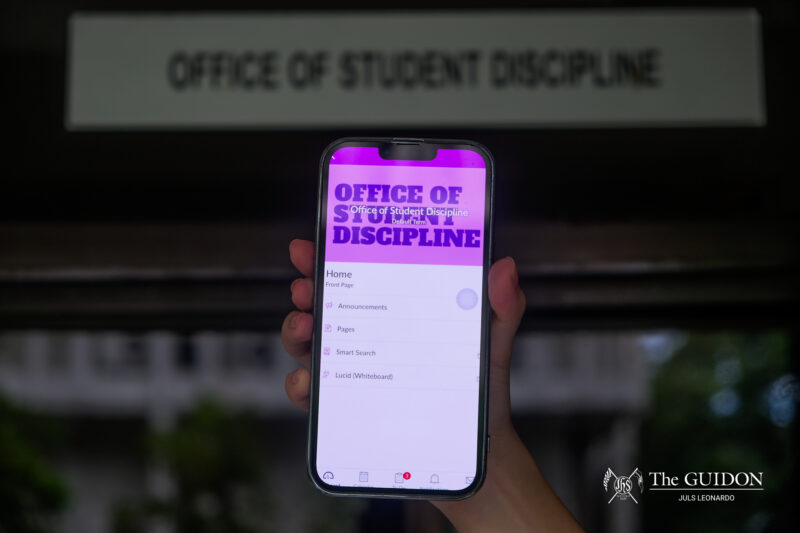“HANGAD NAMING patok ang aming mga paksa sa inyong panlasa (We hope our topics will suit your tastes),” said Communication Department Chair Severino Sarmenta Jr. during his welcoming remarks.
Patok: Comparative and Critical Perspectives on Pinoy Pop Culture, a national conference in honor of the Ateneo Communication Department’s 50th Anniversary, was held last October 6-7. Patok is a Filipino word referring to people, things, and events that are currently trending. Sarmenta added that the patok is what connects people.
Recognizing that media is one of the most recognizable cultural forms and the medium through which pop culture gains presence, the conference seeks to raise recurring and new questions about Philippine pop culture, such as how today’s changing media landscape has affected its consumption, production, and circulation.
The event featured presentations by scholars, professors, Ateneo alumni, and media practitioners in the Leong Hall Auditorium and in the Eugenio Lopez Junior Center of Multimedia Communication TV Studio.
“I hope this conference will not just provide more knowledge about Philippine pop culture but also enrich our conversations about how we can shape the symbolic, social, and political order of the common good, the greater good,” said University President Jose Ramon Villarin, SJ.
Filtering through the noise
“In the age of technology and the mindboggling capacity to produce and multiply anything in a virtual world, millions of images proliferate,” said Interdisciplinary Studies Professor Emeritus Soledad Reyes, the first keynote speaker of the event.
She said they are all “fighting for space in the public’s already teeming consciousness,” each of them “claiming to serve the public’s needs to be entertained, to be taught, to be dazzled, to be taken into a fantastic world where wishes can be fulfilled and our many desires conveyed.”
In light of this, Reyes stressed the need to develop highly critical minds despite being bombarded with new information at every turn. She said this has become more vital now with the presence of Internet trolls and the “violence and lack of civility in national discourse.”
“We have the duty to analyze and read what lies underneath,” said Reyes. She added that this is especially a task for educators, to mold the minds of students and enable them to do so.
Affect and popular culture
The first panel consisted of University of the Philippines Diliman lecturer Alwin Aguirre, and his students Rica Papa and Carl Sayat. They talked about how popular culture makes use of affect or emotional impact.
Aguirre explained how through television advertisements, OFWs are made to feel guilty for leaving their country and family by emphasizing their absence and distance just to promote products like smartphones and apps. He said they also compel OFWs to send back remittances for compensation.
Papa analyzed ABS-CBN’s I Love OPM, a show that featured foreigners doing covers of Filipino songs, and concluded that Filipinos validate themselves problematically through the eyes of the foreigners.
“The only value presented by the show is the appreciation of foreigners… that’s the only value we can attribute to loving ourselves,” she said.
Sayat presented his study on how the campaign ads used by President Rodrigo Duterte during the elections created a myth of his “tapang and malasakit.” He said the myth can be the reason for the political tolerance seen towards Duterte’s actions today, gradually legitimizing violence in the country.
Sport, gender, and national identity
The last panel discussed sports, gender, and national identity. Sarmenta talked about how Pacquiao is seen as a hero by Filipinos— rising from poverty, bringing glory to the country with every fight he wins, and even fostering peace to the point that crime rates fall whenever his match is on.
Sarmenta added that whether it is winning yet again on the world boxing stage, or winning the position of the highest official in the land, Pacquiao’s story still needs an ending.
Communications Instructor Inez Ponce de Leon showed how Filipinos define national identity by studying online discourses regarding Arnold Clavio’s comment about the Philippine Azkals not being real Filipinos.
She said that Filipino netizens who sided with Clavio viewed being Filipino as having been born in the country, having Filipino parents, and having traditional Filipino values. Azkals fans, however, argued that despite not being “full-blooded,” the players are Filipinos because they have a “pusong Pinoy.”
Moreover, National Collegiate Athletic Association Courtside Reporter and Ateneo alumna Cristina Tantengco presented her paper on gendered coverage in Philippine sports media. She found that unlike for males, journalists cover female athletes more for their looks and not for their gameplay— even using descriptors like sexy and “so cute you want to make her into a keychain and keep her in your pocket.”
“It’s a shame that at a time when female athletes are seen to be everywhere, it’s actually not the kind of attention they want in the first place,” she said.







